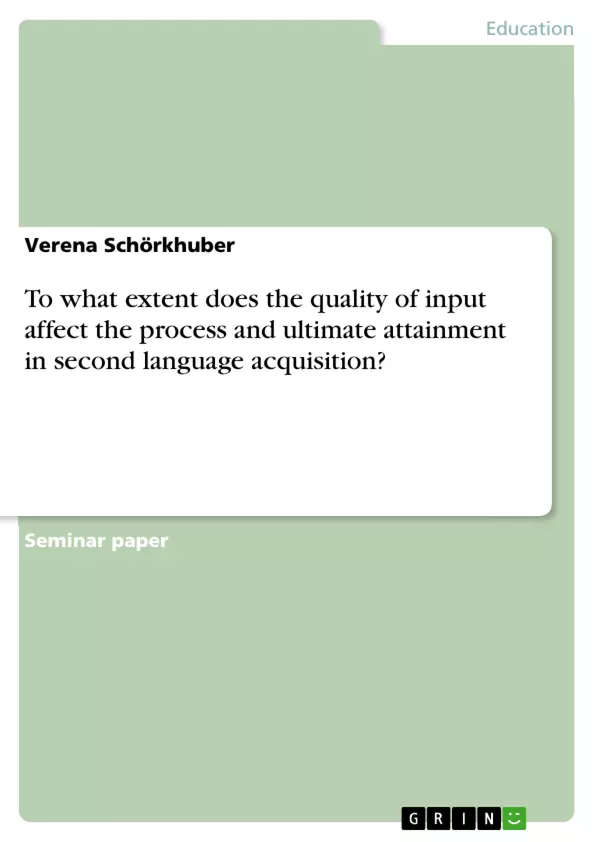This essay addresses a question which is central to input research, namely to what extent the quality of input has an effect on SLA, particularly on the learner's ability to comprehend. Thereby the term 'quality' shall be interpreted as referring to any impact of modified input and negotiated interaction that is not related to its amount or frequency. After a brief review of Krashen's Input Hypothesis, Long's Interaction Hypothesis and Swain’s Comprehensible Output Hypothesis, I will then proceed to suggest ways in which Foreigner Discourse modifications might facilitate SLA. I shall also review a number of studies dealing with (un)modified input-SLA relationships, among which are Long’s (1985) and Gass & Varonis' (1994) study. Due to the constraints imposed upon this essay, I will of course be drawing upon a very small selection of the pertinent literature.
Inhaltsverzeichnis (Table of Contents)
- Introduction
- Krashen's Input Hypothesis
- Long's Interaction Hypothesis
- Swain's Comprehensible Output Hypothesis
- Foreigner Discourse modifications and SLA
- (Un)modified input-SLA relationships - a selection of studies
- Conclusion
Zielsetzung und Themenschwerpunkte (Objectives and Key Themes)
This essay examines the impact of input quality on second language acquisition (SLA), particularly focusing on how it affects a learner's comprehension ability. It explores the concept of "quality" as it relates to modified input and negotiated interaction, going beyond considerations of quantity or frequency. The essay analyzes the role of Foreigner Discourse modifications in facilitating SLA and reviews studies that investigate the relationship between modified and unmodified input and SLA.
- The role of comprehensible input in SLA
- The influence of modified input and negotiated interaction on comprehension
- The impact of Foreigner Discourse modifications on learner development
- The relationship between modified and unmodified input and SLA
- The importance of interaction and negotiation for meaning in SLA
Zusammenfassung der Kapitel (Chapter Summaries)
- Introduction: This chapter introduces the central question of the essay: to what extent does the quality of input affect SLA, particularly on the learner's ability to comprehend? It defines "quality" in relation to modified input and negotiated interaction, and outlines the essay's structure.
- Krashen's Input Hypothesis: This chapter explores Krashen's theory, which emphasizes the importance of comprehensible input for language acquisition. It highlights Krashen's claim that input must be slightly beyond the learner's current competence (i + 1) and that the learner must be receptive to it. The chapter also examines the role of modifications in speech, such as foreigner-talk and teacher-talk, in increasing input comprehensibility.
- Long's Interaction Hypothesis: This chapter focuses on Long's theory, which emphasizes the role of interaction in promoting comprehension and acquisition. It argues that modifications to discourse structure, such as modified input and negotiated interaction, contribute to comprehensible input, thereby facilitating acquisition. The chapter contrasts Long's theory with Krashen's and highlights the importance of negotiation for meaning in the SLA process.
- Swain's Comprehensible Output Hypothesis: This chapter explores Swain's theory, which argues that output is crucial in SLA. It highlights Swain's observations of French immersion students in Canada, who exhibited strong performance in non-interactive, extended discourse but struggled with grammatical aspects. The chapter explores how language production helps learners develop their grammatical and linguistic competence.
- Foreigner Discourse modifications and SLA: This chapter examines the concept of Foreigner Talk and its variations. It describes how adjustments to non-native speakers are made in speech rate, phonology, morphology, syntax, vocabulary, discourse, interactional patterns, and nonverbal behavior. The chapter argues that these modifications aim to enhance communication and comprehension for L2 learners, based on Krashen's claim that comprehensible input is essential for acquisition.
Schlüsselwörter (Keywords)
This essay focuses on the role of input quality, modified input, negotiated interaction, Foreigner Discourse modifications, and comprehension in second language acquisition (SLA). It explores the interplay between comprehensible input, interaction, and output, drawing upon theories by Krashen, Long, and Swain. The essay also examines studies that investigate the relationship between modified and unmodified input and SLA.
Frequently Asked Questions
How does input quality affect Second Language Acquisition (SLA)?
Input quality, specifically modified input and negotiated interaction, significantly enhances a learner's ability to comprehend and acquire a new language.
What is Krashen's Input Hypothesis?
It claims that language is acquired when learners receive "comprehensible input" that is slightly beyond their current level (i + 1).
What role does interaction play in Long's hypothesis?
Long's Interaction Hypothesis suggests that the negotiation for meaning during interaction makes input more comprehensible, thereby facilitating SLA.
What is Foreigner Discourse?
Foreigner Discourse refers to the adjustments native speakers make in speech rate, vocabulary, and syntax to help non-native speakers understand them better.
Why is Swain's Output Hypothesis important?
Swain argues that producing language (output) is as crucial as receiving it, as it forces learners to process language more deeply and improve their grammar.
- Arbeit zitieren
- Verena Schörkhuber (Autor:in), 2007, To what extent does the quality of input affect the process and ultimate attainment in second language acquisition?, München, GRIN Verlag, https://www.grin.com/document/86181



